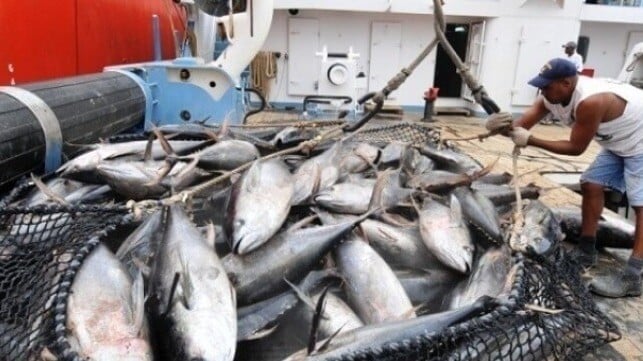NGOs Warn That Sustainable Seafood Label May Hide High-Seas Labor Abuses

The Marine Stewardship Council (MSC) finds itself under fire again over its vetting standards, this time for allegedly overlooking the use of forced labor in overseas fisheries. A coalition of environmental and labor NGOs has called on MSC to acknowledge that its label may not be "fit for purpose" for evaluating labor standards in the complex, opaque seafood supply chain.
Labor exploitation is a fact of life in a segment of the global fishing fleet, and its ubiquity and ease of concealment out on the high seas make it a challenge to exclude from the supply chain. At least 128,000 fishermen are subjected to forced labor conditions worldwide, according to conservative estimates by the International Labor Organization, and the agency believes the real number is likely higher.
In an open letter, a coalition led by Global Labor Justice asserted that MSC's certification program is not combating that challenge, and may be impeding efforts to fight labor abuses. The NGOs cited a 2024 study of MSC's vetting program for the tuna industry, which found that about half of MSC's tuna fishery certificates "appeared to lack any form of information on vessel ownership," and that just four percent of MSC tuna certificate holders appeared to own any tuna vessels. The overwhelming majority of the certified companies were market intermediaries, without direct involvement in vessel operations, and MSC's labor compliance check process relied largely on self-declaration.
MSC focuses on ecological sustainability, and it says that its "ecolabel does not offer an assurance on forced or child labor." It emphasizes "the absence of a social claim" in its label's meaning. However, Global Labor Justice and its NGO partners expressed concern that the MSC brand may still be enabling market access for abusive fishing operators.
"Forced labor and labor exploitation remain systemic issues in the fishing industry, and voluntary, piecemeal approaches like MSC’s audits are not fit for purpose to address these challenges," wrote the NGOs in an open letter. "MSC’s fishery-level audits can never effectively capture the complexity of labor exploitation in global supply chains."
The NGOs noted that MSC does not suspend vessels accused of labor violations, but only temporarily delists those that have been convicted of labor abuses in a court of law - a high bar rarely crossed on the high seas. The coalition suggested that MSC has a financial conflict of interest that incentivizes it to certify more vessels, since MSC gets about 88 percent of its revenue from brand licensing royalties linked to its certificates.
Global Labor Justice called for MSC to thoroughly warn purchasers that its ecolabel "does not account for labor and human rights abuses," and suggested that it should inform consumers "that the certification fails to safeguard against forced labor and exploitation."
Co-signers included Greenpeace US, the International Transport Workers' Federation (ITF), Humanity United and Freedom Fund. MSC has not yet responded to the NGOs' claims, but has previously acknowledged that its label is not intended to be a thorough vetting standard for supply chain labor practices.
Top image: Seychelles Nation / CC BY SA 4.0
